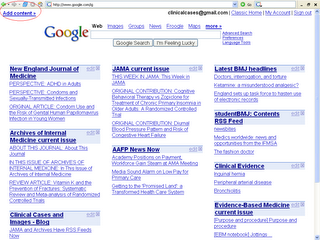 This is a collection of articles I have found interesting in the weekly editions of the "big five" medical journals: NEJM, JAMA, Annals, Lancet and BMJ (a few more journals are included occasionally). The review is a weekly feature of Clinical Cases and Images - Blog. Please see the end of the post for a suggested time-efficient way to stay up-to-date with the medical literature.
This is a collection of articles I have found interesting in the weekly editions of the "big five" medical journals: NEJM, JAMA, Annals, Lancet and BMJ (a few more journals are included occasionally). The review is a weekly feature of Clinical Cases and Images - Blog. Please see the end of the post for a suggested time-efficient way to stay up-to-date with the medical literature.Surgical versus Nonsurgical Therapy for Lumbar Spinal Stenosis. NEJM, 02/2008.
Surgery led to significantly more improvement in all primary outcomes than nonsurgical treatments. NEJM also published a review article in the same issue.
Aprotinin during Coronary-Artery Bypass Grafting and Risk of Death. NEJM, 02/2008.
Aprotinin use on the day of CABG surgery was associated with a higher mortality and a larger increases in serum creatinine compared to aminocaproic acid use. Aprotinin (Trasylol) is used to control bleeding during CABG but accumulating evidence suggests that this practice increases mortality. Trasylol was withdrawn from the U.S. Market in November 2007.
Survival From In-Hospital Cardiac Arrest During Nights and Weekends. JAMA. 2008;299(7):785-792.
Survival from in-hospital cardiac arrest was lower during nights and weekends. See Dr. Wes' comments on the study.
Effect of Glucosamine Sulfate on Hip Osteoarthritis. Annals of Int Med, 02/2008.
Glucosamine sulfate was no better than placebo in reducing symptoms and progression of hip osteoarthritis during the 2-year study period.
Meta-analysis: Effectiveness of Drugs for Preventing Contrast-Induced Nephropathy. Annals of Int Med, 02/2008.
The good: N-Acetylcysteine is more renoprotective than hydration with saline alone. Theophylline may also reduce risk for contrast-induced nephropathy but the association was not statistically significant. The bad: Furosemide increased the risk for contrast-induced nephropathy (relative risk, 3.27). And the indifferent: The remaining agents in the study -- fenoldopam, dopamine, iloprost, statin, mannitol -- did not significantly affect risk.
An audio summary on the topic is also available from the journal.
Perspectives, The art of medicine: History as a medical tool. The Lancet 2008; 371:552-553.
A new generation of medical historians argues that an applied history of medicine can serve as an important tool in medical research.
Body-mass index and incidence of cancer: a systematic review and meta-analysis of prospective observational studies. The Lancet 2008; 371:569-578.
According to this meta-analysis, increased BMI was associated with increased risk of malignancies.
Reviews from American Family Physician
The AFP has a history of publishing review articles that are practical, simple and useful. I like most of them.
Chronic Shoulder Pain: Part I. Evaluation and Diagnosis
Chronic Shoulder Pain: Part II. Treatment
Diagnosis and Treatment of Testicular Cancer
Reducing Tobacco Use in Adolescents
AHA Releases Updated Guidelines on the Prevention of Infective Endocarditis
A time efficient way to stay up-to-date with medical literature
"How do you eat in elephant? In small bites." The same rule probably applies to staying current with the ever expanding avalanche of medical literature. One can try the following approach:
1. Subscribe the to the RSS feeds of the 5 major medical journals (NEJM, JAMA, BMJ, Lancet and Annals) plus 2-3 subpecialty journals in your field of interest.

Medical Journals tab: A screenshot of iGoogle with RSS feeds from the major medical journals.
2. Read the journal on the day it is published online, for example, NEJM on Wednesdays.
3. Use text-to-speech to listen to articles you do not have time to read.
4. Listen to journal podcasts. Click here to subscribe the podcasts of the 4 major journals in iGoogle.
Related:
Make Your Own "Medical Journal" with iGoogle Personalized Page
Share iGoogle Tabs with Medical Journals, Podcasts and Gadgets
Annals of Internal Medicine Launches Podcast and Audio Summaries
Text-to-Speech Programs and Continuous Medical Education
Image source: OpenClipArt, public domain.